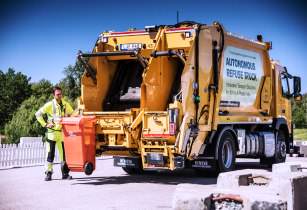As automation takes over day-to-day processes in the every industrial sector, the truck industry is not unaffected by this change. Swedish premium heavy construction machinery maker Volvo Trucks is at the forefront of this automated evolution for more than two decades that promises productivity, safety and energy efficiency
According to Mikael Karlsson, V-P of Productivity and New Concepts, Volvo Trucks is creating a new kind of automation to complement the driving experience.
?This is a key enabler for increased productivity. The technology might involve replacing the human with that of a machine, but the focus is based on customer experience. This is a software-driven approach in which we are looking at taking a broader part of the value chain.?
Volvo Trucks has been working on automated technology for 12 years in both confined spaces and public roads.
Sasko Cuklev, director, Customer Solutions and New Concepts, adds, ?We believe that a high automation level will be achieved in confined spaces since employing automation in public roads is way more complex. As confined spaces are often private areas and, therefore, not subject to restrictions, we are able to test solutions more quickly to capture value. We can learn a lot from that and apply that information for public road solutions.?
Tests involving self-driving vehicles are among several research and development projects in which Volvo Trucks is examining the scope for making trucks more autonomous. Several of the systems found in today?s Volvo trucks, such as adaptive cruise control (ACC), work towards the same goal. The global market will see more and more solutions that offer ever greater degrees of driver support. Self-driving trucks may gradually complement mining operations but for transport operations on public roads the driver will continue to play the major role.
Few of the research projects include automated trucks in Boliden mine, Sweden; sugarcane plantation, Brazil; and refuse truck in Sweden.
Meanwhile, as Dubai Announces its Autonomous Transportation Strategy 2030 for at least 25 per cent of transportation trips to be driverless, Volvo Trucks wishes that commercial vehicles too be a part of this agenda.
However, even as the shift is tilting towards automation in the transport sector, challenges namely regulatory (government and environment), commercial and technological (sensors and codes) remain. Karlsson says that driverless future is possible but only time will say when.
To understand more about the automation technology from Volvo Trucks, please take a look at the upcoming edition Technical Review Middle East Construction Issue 2017.






